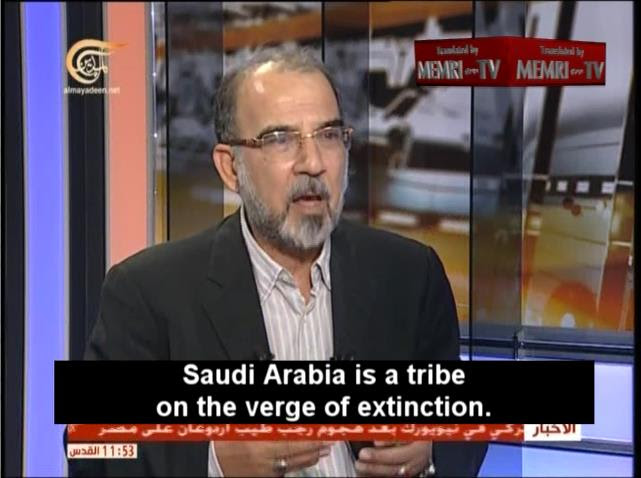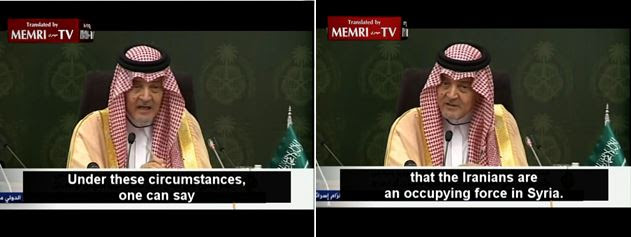Special Dispatch No. 5858
Associates Of Iranian Supreme Leader Khamenei: Saudi Arabia Is The Source Of Scheming Against The Islamic World; The Al-Saud Family Is Of Jewish Origin – And Its Turn To Fall Has Come
The recent escalation in the ongoing geopolitical rivalry between the Shi'ite Persian Iran and the Sunni Arab Saudi Arabia is the result of increased clashes in Yemen between the Iran-supported Houthis and the pro-Saudi regime, as well as of the deepening Islamic State (ISIS) crisis in Iraq and Syria. Iran is claiming that Saudi Arabia has, together with the U.S. and Israel, created, armed, and guided ISIS, with the aim of enabling the group to operate against Shi'ites and against Iran itself, and to create schisms in Islam.
Officials and organizations associated with the ideological camp of Iranian Supreme Leader Ali Khamenei have been harsh in their criticism of Saudi Arabia, and in particular of the Al-Saud royal family. In addition to accusing it of being behind ISIS, they are also claiming that the Al-Saud family is of Jewish origin and is the enemy of Islam. Some are even claiming that the end of the family is at hand.
In a September 6, 2014 article, the editor of the Iranian daily Kayhan, Hossein Shariatmadari, who is an associate of Khamenei, assessed that it was time for the Al-Saud family to fall. Just days before the Yemeni capital San'a fell to the Houthis, Shariatmadari wrote that the family, "the tyrannical regime imposed by the West" in Saudi Arabia that supports the regime in Yemen, would not survive the Houthi revolution there, and that it is also threatened by ISIS members, whom it had cultivated and funded with the aim of having them oust the regimes in Syria and Iraq and who are now returning after suffering defeat in those countries.
Majlis member Alireza Zakani also assessed that the Shi'ite revolution in Yemen would spark a revolution in Saudi Arabia.
On September 7, 2014, a website associated with the Student Basij claimed that the Al-Saud family was falsely claiming to represent Islam in order to gain legitimacy for its rule. It also stated that the Al-Saud family is the sworn enemy of Muslims because it is of Jewish origin, that it came to power thanks to a Jewish plot, and that it conducted close clandestine relations with the Zionist movement prior to the establishment of Israel and as such is a threat to Islam.
A few days later, on September 10, 2014, Ali Saeedi, Khamenei's representative in Iran's Islamic Revolutionary Guard Corps (IRGC), said that Saudi Arabia was backing ISIS terrorism against the Syrian and Iraqi governments, using its financial resources and religious status to scheme against, sow strife in, and destroy the Islamic world.
With the September 2014 Shi'ite Houthi takeover of Sana'a, Iranian spokesmen underlined the link between the Islamic revolution of the Shi'ite Houthis in Yemen and the Islamic Revolution in Iran. They argued that the Yemen events constitute an important geostrategic shift that would bring about the collapse of the Saudi regime and of other Sunni regimes in the region.
MEMRI TV Clip No. 4530
Iranian Analyst Mohammad Sadeq Al-Hosseini: Saudi Arabia Is On The Verge Of Extinction; We Are The New Sultans Of The Mediterranean, The Gulf, And The Red Sea
In a TV interview, Iranian analyst Mohammad Sadeq Al-Hosseini called Saudi Arabia "a tribe on the verge of extinction." Al-Hosseini, a former advisor to Iranian President Khatami, further said: "We in the axis of resistance are the new sultans of the Mediterranean and the Gulf... and we will shape the map of the region. We are the sultans of the Red Sea as well."
Following are excerpts from the interview, which aired on Al-Mayadeen TV on September 24, 2014:
Mohammad Sadeq Al-Hosseini: "The Bab Al-Mandeb Strait and the Strait of Hormuz tighten the noose on the Red Sea, on Israel in the Suez Canal…"
Interviewer: "And you think that Saudi Arabia will have nothing to say about this? The Bab Al-Mandab Strait tightens the noose on its oil experts as well…"
Mohammad Sadeq Al-Hosseini: "Saudi Arabia is a tribe on the verge of extinction. The Saudi ruler represents a tribe on the verge of extinction. This is what the top observers say. End of discussion."
MEMRI TV Clip No. 4552
Saudi Foreign Minister Saud Al-Faisal: Iran Has Occupying Forces In Syria
During an October 13 joint press conference with German Foreign Minister Frank-Walter Steinmeier in Jeddah, Saudi Foreign Minister Saud Al-Faisal stated that Bashar Al-Assad is part of the problem and cannot be part of the solution. He accused Iran of having "occupying forces" in Syria.
Saud Al-Faisal: "We have no reservations regarding Iran as a country or regarding the Iranian citizens. Our reservations have to do with Iran's policies in the region. In many of these conflicts, Iran is part of the problem and not of the solution. In Syria, for example, Iran has forces. Who are these forces fighting in Syria? The Syrians. Is it conceivable that a foreign country joins a civil war, siding with (one camp), and actually fighting against a section of the people? Under these circumstances, one can say that the Iranians are an occupying force in Syria. The Syrian regime, which invited the Iranian forces to help it, has lost its legitimacy, and can no longer represent the Syrian people. Thus, the Iranian forces came of their own accord.
[...]
"Bashar Al-Assad cannot be trusted. He cannot be part of the solution because he has lost his legitimacy."
 | 




No comments:
Post a Comment